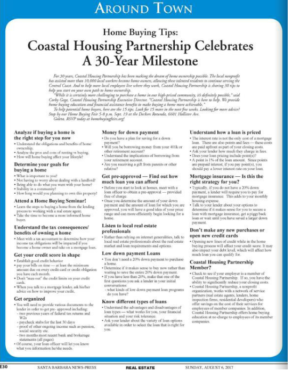30 Home Buying Tips for 30 Years, Part 1
For 30 years, Coastal Housing Partnership has been making the dream of home ownership possible. The local nonprofit has assisted more than 10,000 local workers become home owners, allowing these talented residents to continue serving the Central Coast. And to help more local employees live where they work, Coastal Housing Partnership is sharing 30 tips to help you start on your own path to home ownership.

Published in Santa Barbara News-Press House & Home!
“While it is certainly more challenging to purchase a home in our high-priced community, it’s definitely possible,” said Corby Gage, Coastal Housing Partnership Executive Director. “Coastal Housing Partnership is here to help. We provide home buying education and financial assistance benefits to make buying a home more achievable.”
To help potential home buyers, here are the first 15 tips. Look for 15 more next week. Looking for more advice? Stop by our Home Buying Fair 5-8 p.m. Sept. 19 at the Deckers Rotunda, 6601 Hollister Ave.Goleta. RSVP today at homebuyingfairs.org!
Part One
-
- Analyze if buying a home is the right step for you now
Understand the obligations and benefits of home ownership
Analyze the pros and cons of renting vs buying
How will home buying affect your lifestyle? - Determine your goals for buying a home
What is important to you? Not having to worry about dealing with a landlord? Being able to do what you want with your home? Stability in a community? How long would you be planning to own this property? - Attend a Home Buying Seminar!
Learn the steps to buying a home from the lending process to working with a real estate agent. Take the time to become a more informed home buyer. - Understand the tax consequences/benefits of owning a home
Meet with a tax accountant to determine how your income tax obligations will be impacted if you become a home owner and take on a mortgage loan. - Get your credit score in shape
Establish good credit behavior – pay your bills on time – at least the minimum amount due on every credit card or credit obligation you have each month. Don’t “max-out” the credit limits on your credit cards. When you talk to a mortgage lender, ask his/her advice on how to improve your credit. - Get organized
You will need to provide various documents to the lender in order to get pre- approved including:- two previous years of federal tax returns and W2s
- paycheck stubs for the last 30 days
- proof of other ongoing income such as pension, social security etc.
- two months most recent bank and brokerage statements (all pages)
Of course, your loan officer will let you know what you information he/she needs.
- Money for down payment
Do you have a plan for saving for a down payment? Will you be borrowing money from your 401k or other retirement account? Understand the implications of borrowing from your retirement account. Are you receiving a gift from parents or other relative? - Get pre-approved – Find out how much loan you can afford
Before you start to look at homes, meet with a loan officer to obtain a pre-approval – provided free of charge. Once you determine the amount of your down payment and the amount of loan for which you are approved, you will have a good idea of your price range and can more efficiently begin looking for a home. - Listen to local real estate professionals
Rather than relying on internet generalities, talk to local real estate professionals about the real estate market and loan requirements and options. - Low down payment Loans
You don’t need a 20% down payment to purchase a home. Determine if it makes sense to buy now rather than waiting to save the entire 20% down payment. If you have less than 20%, make that one of the first questions you ask a lender in your initial conversations: what kinds of low down payment loan programs do you have? - Know different types of loans
Understand the advantages and disadvantages of loan types – what works for you, your financial situation and your risk tolerance. Ask your lender about the variety of loan options available in order to select the loan that is right for you. - Understand how a loan is priced
The interest rate is not the only cost of a mortgage loan. There are also points and fees – these costs are paid upfront as part of your closing costs. Ask your lender how much they charge in fees. Does your loan pricing include point(s)? A point is 1% of the loan amount. Since points are prepaid interest, if you pay point(s), you pay should pay a lower interest rate on your loan. - Mortgage insurance – is this the right strategy for you?
Typically, if you do not have a 20% down payment, a lender will require you to pay for mortgage insurance. This adds to your monthly housing expense. Talk to your lender about your options to determine if it makes sense for you to secure a loan with mortgage insurance, get a piggyback loan or wait until you have saved a larger down payment. - Don’t make any new purchases or open new credit cards
Opening new lines of credit while in the home buying process will affect your credit score. It may also impact your debt level, which will affect how much loan you can qualify for. - Coastal Housing Partnership Member?
Check to see if your employer is a member of Coastal Housing Partnership. If so, you have the ability to significantly reduce your closing costs. Coastal Housing Partnership, a nonprofit organization, works with a network of service partners (real estate agents, lenders, home inspection firms, residential developers) who offer savings on the cost of their services for employees of member companies. In addition, Coastal Housing Partnership offers home buying education at no charge to employees of its member companies.
- Analyze if buying a home is the right step for you now

